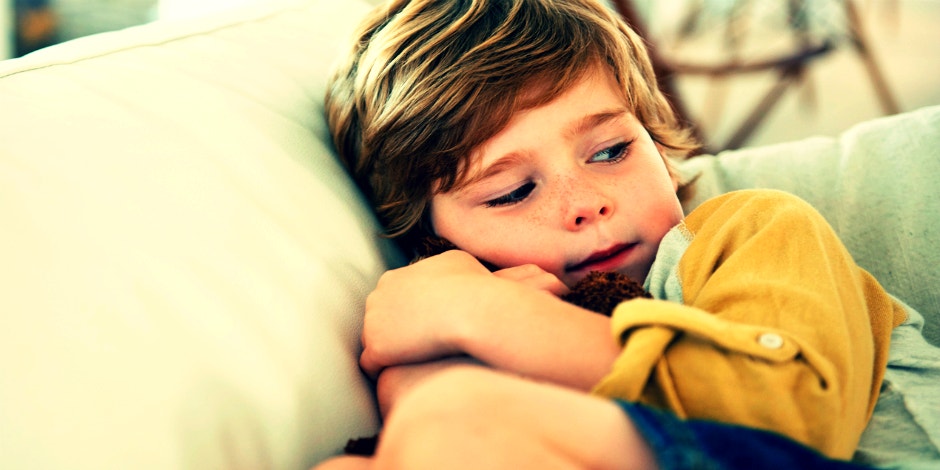The 9 Things You REALLY Teach Your Kids When You Spank Them
Heartbreaking.
 istock
istock Spanking is a common — and many times, socially acceptable — way many parents choose to discipline their kids, but a 2009 study revealed that physical punishment can actually REDUCE the gray matter in children's brains. As shocking as that may sound, the study concluded that "exposing children to HCP (harsh corporal punishment) may have detrimental effects on trajectories of brain development."
Whether or not you agree with the findings (or not), here's what spanking teaches your kids when you punish them.
1. The "stronger" person gets to decide what's right.
When you use physical punishment to show a child he/she did something wrong, you are sending the unintended message that whomever is bigger and stronger decides what's right and what's wrong. Does this mean your child can determine what's right when he or she becomes stronger than you? Could this contribute to why elder abuse is so prevalent?
2. Bigger people are supposed to hit smaller people.
You're sending the message that older, bigger people have the right to hit younger, smaller people. This is especially confusing when you're disciplining a child for hitting someone. What do you think can happen when your child grows to be bigger than you?
3. Violence solves problems.
Spanking also shows children that violence is an appropriate way to solve life's problems. "If I don't like what you do, then I'm going to hit you." Physically punishing your child can be perceived as a form of bullying, sending the message to your child that this is an effective way to get others to do things your way.
4. Something is wrong with them.
When children are hit by the very people who are supposed to protect them, it causes a child to question, "What’s wrong with me?" Self-esteem is a critically important and fragile thing. If you want your child to succeed in life, the level of his or her self-esteem will be a major determining factor.
5. You're OK with damaging them emotionally and cognitively.
According to a study conducted at the Children's Hospital of Eastern Ontario in Ottawa, they've found that corporal punishment causes cognitive impairment and long-term developmental difficulties. I am willing to bet that when spanking your child, your intention wasn't to create long-term developmental problems.
6. They can't trust you.
Do you remember being hit as a child? Do you ever remember thinking afterward, "I'm so thankful my parent loves me enough to hit me?" Of course you didn't! You were probably thinking, "I hate you" or some version of an anti-relationship building comment.
Of course that doesn't last long if parents do an overall good job of parenting. However, spanking can shake the foundation of trust between you and your child. Your child trusts you to always have his or her best interests in mind. Spanking can greatly cause your child to question this premise.
7. To be so afraid that it actually shuts down parts of their brains.
The work of Dr. Bruce Lipton has shown us that it is biologically impossible to learn and implement higher-order thinking when fearful. Spanking actually makes kids perform worse in school.
The fear response triggers the fight or flight instinct and adrenaline and cortisol flood our bloodstream and brains. Our blood is diverted to our extremities and higher order frontal lobe thinking is basically shut down in favor of more reflexive responses, originated from our instinctual brain stem area. If you want your child to learn something, it's critical to reduce fear rather than increase it.
8. To lose respect for you.
I have always said, "Relationship is the root of all influence." When you think of those people you listen to, trust and seek out for advice, it's those people who support and encourage you, not generally those who "smack you down," either literally or physically. Do you want to have influence with your child? Then you might want to stop hitting him or her, even if it's for "his own good."
9. It's better to lie and manipulate in order to avoid physical punishment.
When you think about punishment, it generally does not deter behavior unless the punisher is present. Most people do what they want to do unless the risk of detection is high. What spanking teaches your kids is to avoid detection by avoiding the parents.
We've learned by now that there are better ways to teach children right from wrong than to punish them through hitting.
There was a time in history when we "cured" headaches by drilling holes in people's heads to let evil spirits out. There was also a time when we sent messages via pony express and/or telegraph. These methods were effective for the time because it was the best we knew how to do with the information available to us.
But that was then. We no longer have to spank children to have them understand the "error" of their ways — thankfully, we've made advances in parenting. We now know how to communicate in a way that actually teaches, rather than punishes. Doing something because it's always been done that way and worked out in the past is not a good reason for continuing.
The Latin root of discipline means "to teach," while the Latin root of punishment means "to inflict pain." Let's practice more humane ways of teaching our children our version of "right" and "wrong" instead of trying to "inflict pain." They will thank you. Their children will thank you. And their children's children will thank you.
Spanking can cause more harm than good. But check out the video below for tips on the best ways to discipline children:
.......
Kim Olver, LCPC, has been featured in Whole Living, Women's World, Fitness Magazine and Counseling Today and is the best-selling, award winning author of Secrets of Happy Couples: Loving Yourself, Your Partner, and Your Life.

